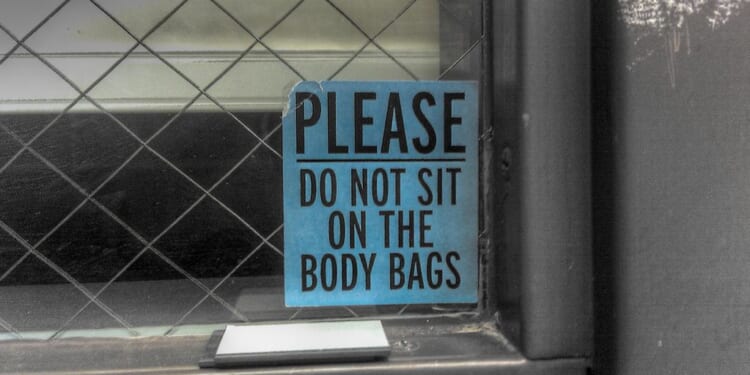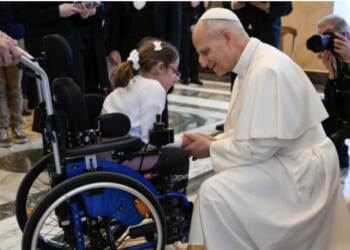Georgia L Gilholy is a journalist.
The office of the coroner has more than 800 years of history in England. Meaning simply “officer of the Crown”, the job’s medieval iterations had far wider responsibilities than its modern successor, but they would be recognisable in their authority to probe certain categories of deaths.
Under current rules, in every suspected unnatural death in the UK, a coroner must “inquire into the causes and circumstance of a death… where there is reasonable suspicion that the deceased has died a violent or unnatural death, where the cause of death is unknown or if the deceased died while in custody or state detention”.
The Leadbeater Bill would remove the automatic duty to notify a coroner when a death is an assisted suicide in accordance with the law, despite the fact that this death clearly falls into the “unnatural” category. Perhaps, given that this Bill contains so many other, more headline-grabbing flaws, its backers expected this issue to easily slip under their opponents’ radars?
Luckily Thomas Teague KC, former Chief Coroner, brought this to the fore last week, warning peers that the “frankly absurd” idea of excluding coroners would erase a key deterrent against coercion and cover-ups.
Dr Suzy Lishman, former president of the Royal College of Pathologists, even cautioned that under the Bill’s model, “one could argue Harold Shipman would be on the assisted dying panel.” And who can blame her?
Indeed, how can we create death-approval bodies without the threat of independent scrutiny from coroners after the death has been carried out? Surely this will simply result in rubber-stamping morally dubious assisted suicide requests? Or, poor medical practice and even deliberate foul play slipping through the cracks?
We already know that this renewed push for assisted suicide could hardly come at a worse time. NHS waiting times are at record highs, and the media is chock-a-bloc with horror stories of wrongful deaths of people under its “care”. One man with Down’s Syndrome was starved to death on an NHS ward where he had been recovering from a broken hip.
An unknown number of people living with disabilities and mental health issues have been left to suffer preventable deaths as a result of “Do Not Resuscitate” orders placed on their medical notes without the knowledge of the patient or their families. Moreover, these are just a slim chunk of stories that actually made the news. On Thursday this week, Baroness Tanni Grey-Thompson told peers that she has received countless anecdotes about such discrimination. Is it any surprise that over 350 UK disability charities openly oppose the Bill?
Professor Jane Monckton-Smith OBE, Professor of Public Protection at the University of Gloucestershire, recently told peers that 34 people every week take their lives because of domestic abuse. Legalising assisted suicide would benefit abusers and put some of the most vulnerable people at risk. How can we know if a person is seeking assisted suicide due to suffering from domestic abuse or suffering from an illness?
She also highlights the inadequacy of current proposals for the ‘death panels’ that would consider assisted suicide applications – they simply aren’t fit for purpose when it comes to detecting coercion.
Might the Bill’s backers even be cautiously afraid of what coroners might find if they were tasked with probing each and every assisted suicide? Last year, The Telegraph reported that Ontario’s chief coroner recorded 428 cases of MAiD (Medical Assistance in Dying) non-compliance since 2018. A policy review also found that in 2023, roughly a quarter of MAiD providers had at least one compliance issue flagged.
In Ontario and British Columbia, a MAiD death may be reported to a coroner if something seems irregular, but how can we expect issues to be flagged in an already overstretched and often callous healthcare context if coronial oversight is not compulsory in every single case of unnatural death?
The Bill proposes that a far inferior degree of scrutiny be rerouted to medical examiners (MEs), whose role is set to be outlined via secondary legislation. Lishman noted that fastidious MEs would probably still refer such deaths to coroners, since MEs are not trained to detect coercion, nor were they designed or resourced for probing assisted suicides.
A survey found that around 81 per cent of MEs do not want involvement at all in probing assisted suicide deaths. In other words, the Bill suggests that MEs be tasked with similar duties to coroners, but for which they are not trained. They will not be obliged to escalate to coroners, meaning dubious cases will surely slip through the cracks of already-strained public institutions.
The ancient office of Coroner has been replicated in many foreign jurisdictions from California to Hong Kong for good reason, because it is necessary.
Peers should follow the advice of Alasdair Henderson KC, that they should vote against this Bill if they have “any doubts” about its safeguards.









![Keith Ellison Caught Promising to Fight State Agencies for Somali Fraudsters [WATCH]](https://www.right2024.com/wp-content/uploads/2026/01/Keith-Ellison-Caught-Promising-to-Fight-State-Agencies-for-Somali-350x250.jpg)







